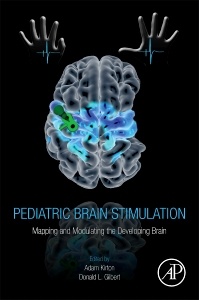Description
Pediatric Brain Stimulation
Mapping and Modulating the Developing Brain
Coordinators: Kirton Adam, Gilbert Donald L.
Language: English
Subjects for Pediatric Brain Stimulation:
Keywords
Acute seizure treatment; ADHD; Adolescents; Animal model; Attention deficit hyperactivity disorder; Autism spectrum disorder; Autistic spectrum disorder; Basal ganglia; Biomarkers; Brain stimulation; Brain�computer interfaces; Cerebral palsy; Childhood; Childhood-onset schizophrenia; Children; Clinical trials; Concussion; Congenital hemiparesis; Constraint-induced movement therapy; Cortical excitability; Deep brain stimulation (DBS)Dystonia; Deep brain stimulation; Depression; Development; Developmental disorders; Developmental neuroplasticity; Diagnostic biomarkers; Dystonia; Epilepsy surgery; Epilepsy treatment; Excitability; GABA; Glutamate; Headache; Hemiparesis; Intracortical facilitation; Intracortical; Invasive neuromodulation; Ipsilateral corticospinal tract; Language mapping; Long-term depression; Long-term potentiation; Migraine; Mirror movements; Motoneurons; Motor cortex; Motor learning; Motor mapping; Movement disorders; Neural circuits; Neuromodulation; Neuromotor maturation; Neurophysiology; Neuroplasticity; Neurosurgery; Non-invasive brain stimulation; Non-invasive; Pain; Paired associative stimulation (PAS)Repetitive transcranial magnetic stimulation (rTMS)Theta burst stimulation (TBS)Parkinson's disease; Pathophysiology; Pediatric; Pediatrics; Perinatal stroke; Plasticity; Post-concussion syndrome; Presurgical mapping; Preterm birth; Repetitive transcranial magnetic stimulation; Responsive neurostimulation; Resting motor threshold; Review; Robotics; Rodents; rTMS; Safety; Synaptic plasticity; tDCS; TES; Theta burst stimulation; TMS; Tourette syndrome; Transcallosal inhibition; Transcranial alternating-current stimulation; Transcranial direct current stimulation; Transcranial direct-current stimulation; Transcranial magnetic stimulation; Transcranial MRI-guided focused ultrasound; Translational neuroscience; Translational research; Traumatic brain injury; Treatment; Unilateral spastic cerebral palsy; Vagal nerve stimulation
500 p. · 15x22.8 cm · Hardback
Description
/li>Contents
/li>Readership
/li>Biography
/li>Comment
/li>
Pediatric Brain Stimulation: Mapping and Modulating the Developing Brain presents the latest on this rapidly expanding field that has seen an exponential growth in publications over the past 10 years. Non-invasive modalities like TMS can painlessly map and measure complex neurophysiology in real patients. Neuromodulatory applications like rTMS and tDCS carry increasingly proven therapeutic applications. Rapidly advancing technological methodologies are increasing opportunities and indications.
Despite all these benefits, applications in the more plastic developing brains of children are only just emerging. This book provides a comprehensive overview of brain stimulation in children. Chapters include Transcranial Magnetic Stimulation (TMS) fundamentals, brain stimulation in pediatric neurological conditions, and invasive brain stimulation.
The main audience for this research will be those interested in applying brain stimulation technologies to advance clinical research and patient care, although a wide variety of clinicians and scientist will find this to be a valuable reference on brain stimulation with specific chapters on a variety of conditions.
1. TMS basics: Single and paired pulse neurophysiology - Ephrem Zewdie and Adam Kirton
2. Assessing normal developmental neurobiology with brain stimulation - Karina Limburg, Nikolai H. Jung and Volker Mall
3. Neuroplasticity Protocols: Inducing and measuring change - Steve W. Wu and Ernest V. Pedapati
4. Therapeutic rTMS in children - Donald L. Gilbert
5. Transcranial direct current stimulation (tDCS): Principles and emerging applications in children - Adam Kirton and Patrick Ciechanski
6. Insights into pediatric brain stimulation protocols from preclinical research - Alexander Rotenberg
7. Pediatric issues in neuromodulation: Safety, tolerability and ethical considerations - Kathleen M. Friel, Andrew M. Gordon, Jason B. Carmel, Adam Kirton and Bernadette Gillick
Section II: NIBS IN PEDIATRIC NEUROLOGICAL CONDITIONS
8. TMS applications in ADHD and developmental disorders - Donald L. Gilbert
9. TMS mapping of motor development after perinatal brain injury - Martin Staudt
10. The right stimulation of the right circuits: Merging understanding of brain stimulation mechanisms and systems neuroscience for effective neuromodulation in children - Jason B. Carmel and Kathleen M. Friel
11. Therapeutic brain stimulation trials in children with cerebral palsy - Bernadette Gillick, Kathleen Friel, Jeremiah Menk and Kyle Rudser
12. Brain Stimulation in Children Born Preterm – Promises and Pitfalls - Julia B. Pitcher
13. Brain stimulation to understand and modulate the autism spectrum - Lindsay M. Oberman, Alvaro Pascual-Leone and Alexander Rotenberg
14. Clinical applications of brain stimulation in pediatric epilepsy - Sudha Kessler
15. Brain stimulation in pediatric depression: Biological mechanisms - Paul Croarkin, Stephanie Ameis and Frank P. MacMaster
16. Brain stimulation in childhood mental health: Therapeutic applications - Frank P. MacMaster, Mariko Sembo, Keon Ma and Paul Croarkin
17. Transcranial Magnetic Stimulation Neurophysiology of Paediatric Traumatic Brain Injury - Karen Maria Barlow and Trevor Adam Seeger
18. Brain Stimulation Applications in Pediatric Headache and Pain Disorders - Thilinie Rajapakse and Adam Kirton
Section III: INVASIVE BRAIN STIMULATION IN CHILDREN
19. Deep brain stimulation in children: Clinical considerations - Jean-Pierre Lin
20. Deep brain stimulation in children: Surgical considerations - Ratan Bhardwaj
21. Invasive neuromodulation in pediatric epilepsy: VNS and emerging technologies - Manish Ranjan and Walter Hader
22. Emerging Applications and Future Directions in Pediatric Neurostimulation - Donald L. Gilbert and Adam Kirton
Clinicians, researchers, and professionals in neurology, neurosurgery, neuroscience, and psychiatry
Donald L. Gilbert, MD, earned his Bachelor of Arts at Princeton University, where he majored in philosophy. He subsequently earned his MD at the University of Michigan and spent a year at the National Institutes of Health as a Howard Hughes Medical Institute Research Scholar. Dr. Gilbert trained in pediatrics and pediatric neurology at Johns Hopkins in Baltimore and is board certified in neurology with special competence in child neurology. Dr. Gilbert has an MS in clinical research design and statistical analysis from the University of Michigan.
At Cincinnati Children's, Dr. Gilbert directs the Movement Disorders and Tourette Syndrome Clinics, which specializes in evaluation and pharmacologic treatment of tics, tremor, chorea, ataxia, dystonia, stereotypies, drug-induced movement disorders, paroxysmal movement disorders, and functional movement disorders https://www.cincinnatichildrens.org/service/m/movement. Dr. Gilbert directs or participates in a number of single and multi-center studies into causes and treatments of Tourette syndrome and pediatric movement disorders. Dr. Gilbert also studies physiological mechanisms of motor control in Tourette Syndrome and Attention Deficit Hyperactivity Diso
- Provides an overview of recent findings and knowledge of pediatric brain stimulation and the developing brain
- Edited by renowned leaders in the field of pediatric brain stimulation
- Presents a great resource for basic and clinical scientists and practitioners in neuroscience, neurology, neurosurgery, and psychiatry
These books may interest you

Brain Stimulation and Language 208.65 €

Brain Stimulation and Language 96.92 €


